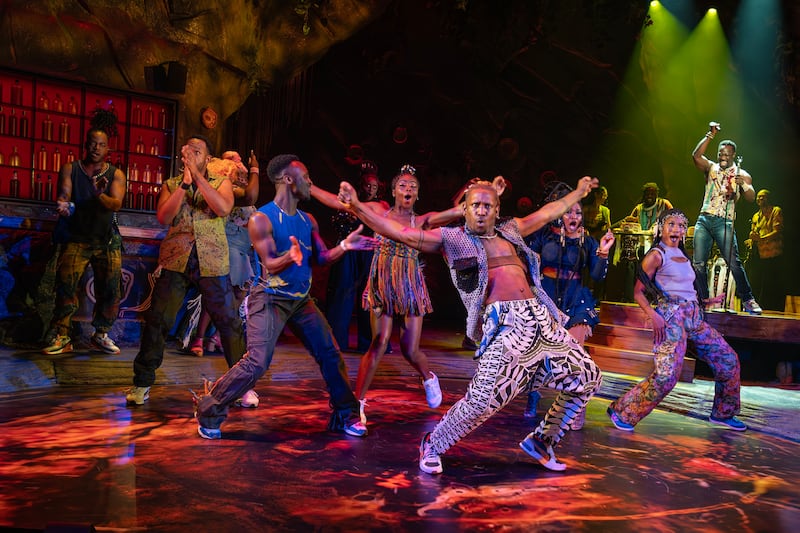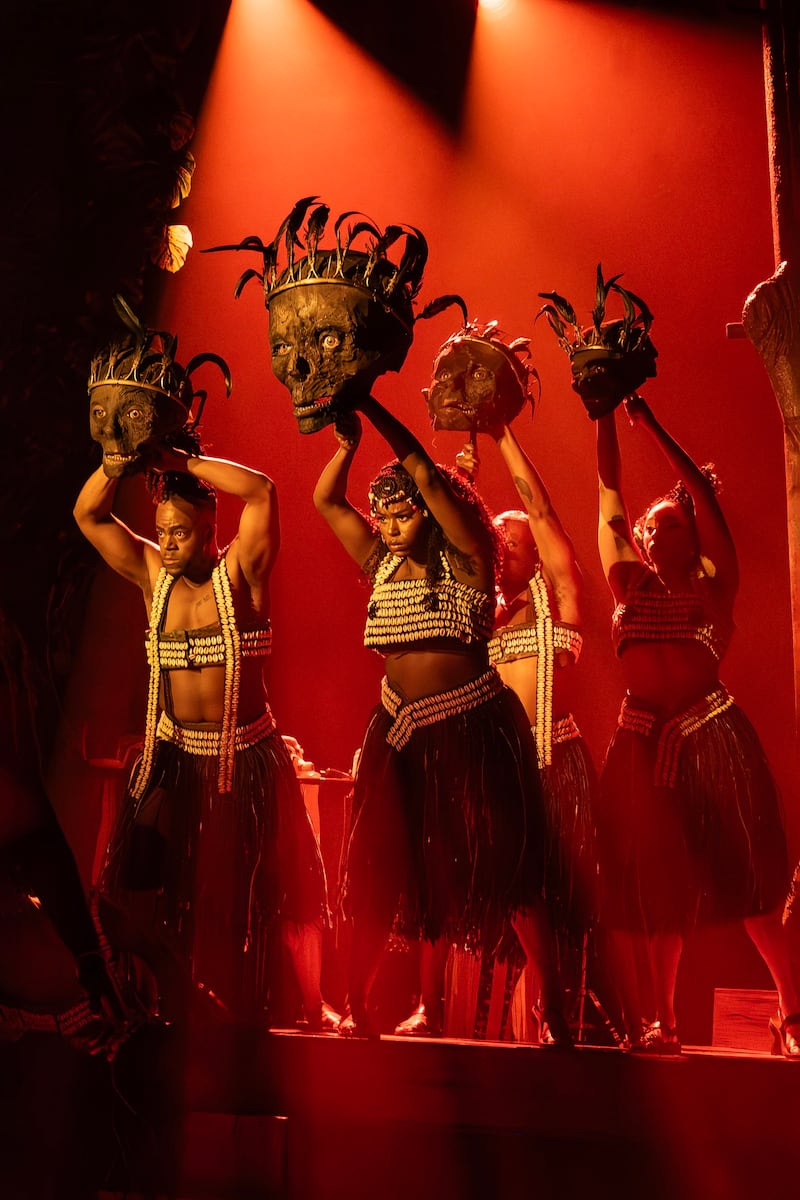For a moment, cease the Tony Awards chatter. The best songs and singing and most dazzling choreography in New York City right now is happening off-Broadway. Audra or Nicole? For a few hours at least, you won’t care. There is a new, stage-conquering diva to lose your minds over.
If Amber Iman stays attached to Goddess (Public Theater, booking to June 8), and if the show follows other Public Theater transplants—Hamilton, Suffs, Hell’s Kitchen—to the bright lights of uptown, then Iman may well again become the subject of Tony Awards chatter herself (she was already nominated for her role in the much-debated Lempicka).
Goddess is inspired by the real life of book writer and director Saheem Ali, who first heard the myth of Marimba, the goddess of music, when he was at high school in Kenya. Iman plays Marimba in her most ancient and also modern incarnation as the character Nadira. It is no accident that the current Broadway musical Goddess most echoes is Buena Vista Social Club, which Ali also directs. Both share a swirlingly insistent, immersive energy, celebrating the intersection of music and history in Cuba and Kenya respectively.
Goddess is principally set in a club called Moto Moto, where Nadira lives in the cavernous back room, and then, when the club is pumping at night, sings stunningly out front. The beauty and facility of Iman’s voice is stunning: she soars, commands, and mesmerizes, with a correspondingly dramatic backdrop of Arnulfo Maldonado’s grand, lightly fantastical design, Bradley King’s shimmering lighting, and Dede Ayite’s goddess-appropriate costumes.

Moto Moto is proudly diverse and always the place to party, hence a merrily combustible showcase for Michael Thurber’s music and lyrics and choreography by Darrell Grand Moultrie, which is group dance at its most exuberant.
The musical’s book is its not-fatal weakness. The love story at the heart of the show is between Nedira, and handsome, would-be politician Omari (Austin Scott). But his storyline—already engaged, rich, politically influential family—is a flat, join-the-dots retelling of the too-familiar of cool kids rebelling against prescriptive parents.
Can Omari forge his own path to be the political candidate he wants to be, rather than following directly in his father’s shadow? How can Nedira defy her own predestined path of being a harbinger of war, as opposed to the music she prefers to exhibit her power through?
The love story between Nedira and Omari also stays stuck in resolute neutral. The dramatic problem is she’s a goddess, he’s a mortal, so how is that ever going to work? The corresponding problem in the show is that Iman really is a goddess-like presence, and Omari seems a gloomy suck on her energies and time. If there’s anyone who can do better, she can. The musical doesn’t make a persuasive case that the pair are star-crossed lovers. Instead of wanting them to be together, you want…well her to carry on being otherworldly-fabulous, while he runs Mombasa (or whatever).

Also helping blow the creaky plot from our minds is a supreme supporting company—with notable performances by Nick Rashad Burroughs and Arica Jackson—who power its song and dance, until a final, extravagantly bonkers scene which underlines Iman’s majesty and the show’s title.
Creditors
Alongside Hugh Jackman playing so successfully against type in Sexual Misconduct of the Middle Classes, Liev Schreiber leans into his most creepily malign in Audible’s equally starry, just-as-much-of-a-treat, companion piece—Jen Silverman’s adaptation of August Strindberg’s Creditors (Minetta Lane Theatre, to June 18).
Again directed by Ian Rickson within a taut 80 minutes, Schreiber excels as Gustav, a teacher who meets an artist, Adi (Justice Smith). They shoot the breeze about art, but Gustav is really focused on persuading the other man that his marriage to wife Tekla (Maggie Siff) is in trouble, and that their relationship’s failure is all down to her. Adi leaves, only for Tekla to appear to face Gustav—and a cascade of truths about marriage, betrayal, and jealousy follow. The trio play their parts as sharply as Jackman and Ella Beatty do in Sexual Misconduct, with Siff particularly impressive as Tekla, exasperatedly trying to set the scarily deluded Gustav straight about their past and future.
Lights Out
In Lights Out (New York Theatre Workshop, to June 29) by Colman Domingo and Patricia McGregor (who also directs the show), Dulé Hill plays Nat “King” Cole in a determinedly original, not entirely successful, musical about the entertainer as he surveys his life on the evening of his final TV show.
Those hoping for a conventional musical about Cole, with his famous songs lushly played, should prepare themselves for something more experimental, as Hill—accompanied by an excellent Daniel J. Watts as Sammy Davis Jr.—wrestles with the despicable and open racism of the entertainment industry and fraught familial matters. Lights Out feels more an interesting theatrical exercise than polished, coherent musical, with our audience’s rapturous response to an astonishing tap sequence featuring Hill and Watts (crafted by Jared Grimes) neatly expressing that the insertion of a little more musical convention might lift some of the dulling effects of the experimentation.
Bus Stop
You really, really enjoy spending time with the characters in Bus Stop (Classic Stage Company, to June 8), William Inge’s classic 1955 play about a group of people, snowbound and stranded overnight at a bus stop diner in Kansas. The latest New York production of the play, directed by Jack Cummings III, is the first to feature an all-Asian American cast. Peiyi Wong’s in-the-round design means we gaze intimately down on to the conversations and drama in the diner itself—complete with redolent food smells.
Cherie (an excellent Midori Francis), has been half-kidnapped by cowboy Bo (Michael Hsu Rosen) for a new life far away—and regretting her decision—while café owner Grace (Cindy Cheung), who has seen so much all before, lusts after bus driver Carl (David Shih). Café waitress Elma (Delphi Borich) seems dangerously naïve to the intentions of sinister philosophy professor Dr. Lyman (Rajesh Bose).
Moses Villarama as Bo’s mysterious, guitar-strumming buddy Virgil, and David Lee Huỳnh as the local sheriff try to keep the disturbingly obsessive Bo under control. The characters’ stories and desires fade and flare, much as the hours of a lost night can feel the same. While some performances are better than others—and while a happy ending a play in 1955 might propose feels far from that in 2025—the company is so appealing that when the early morning comes to usher the characters’ departure you almost wish for another snowstorm and hot cup of coffee.
The post Amber Iman Is Giving the Best Acting Performance in New York Right Now appeared first on The Daily Beast.




